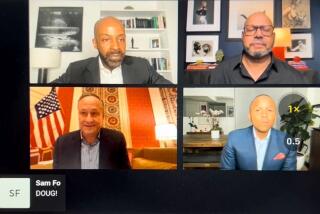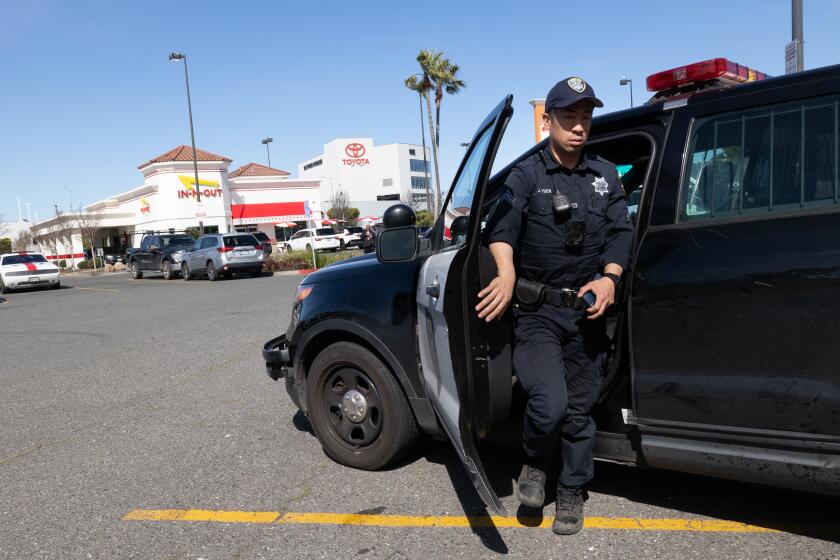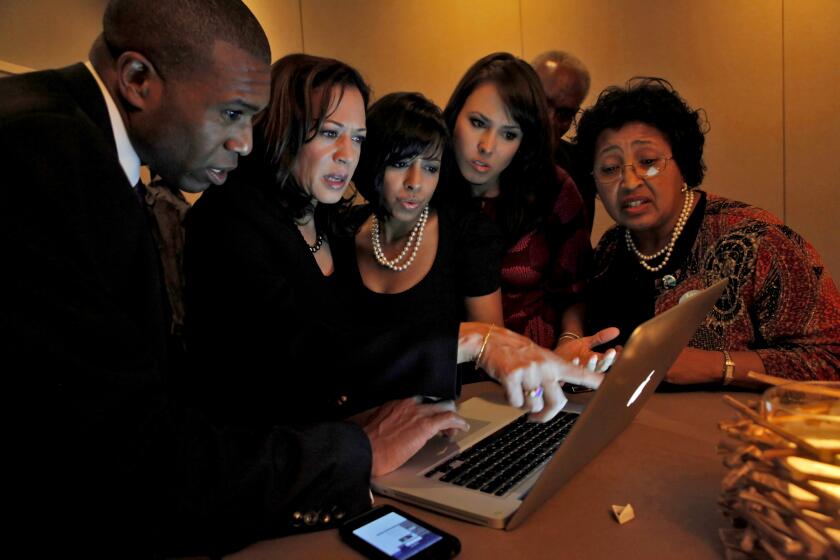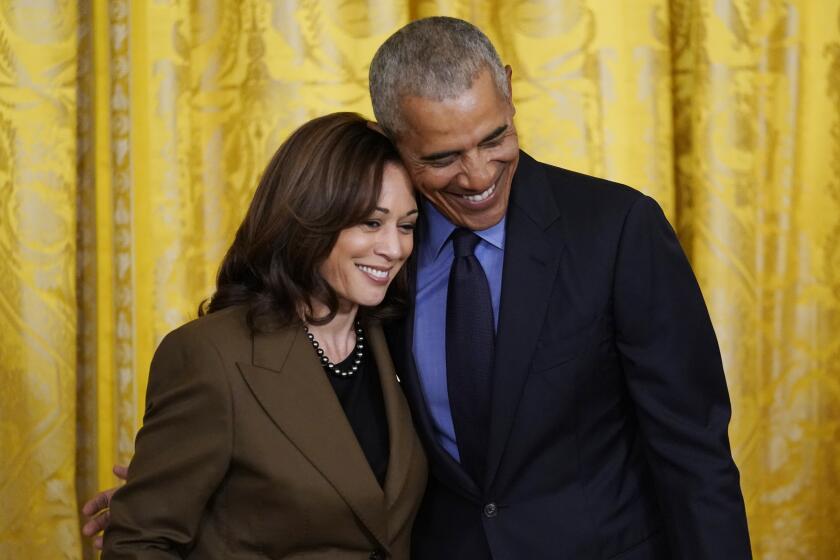Interactive TV Sessions a Hit for Lawmakers, Public : Capitol: Calls have poured in at five hearings aired on the California Channel. But critics say the involvement is illusory and opportunities for abuse abound.
This was vintage talk TV. As a trio of television cameras stared, phone calls from the public poured in. The topic was pure Geraldo: prison inmates who use the mail to harass their victims.
It struck a nerve out in television land. Callers were outraged! Disgusted! Fed up with the bureaucratic ineptitude! Oprah would have been delighted.
But this was not the verbal slash-and-burn of talk television. Instead, the setting was a green-carpeted Capitol hearing room, where the Assembly Public Safety Committee last week conducted what promises to become a staple of legislative life in Sacramento--an interactive hearing.
Borrowing from Ross Perot and his nationwide town hall meetings, the Legislature has begun taking calls from everyday citizens during hearings on key topics televised over the nonprofit California Channel, which reaches 2.6 million households in the state through 62 cable TV outlets.
So far, five interactive hearings have been held in Sacramento since the concept debuted in February. Many more are expected. The idea is to open up the legislative process, to make it more user-friendly, to create a hearing room without walls and occupancy limits.
“It gives people a sense that they can participate, that government is somewhat accessible,” said Assemblyman Tom Umberg, the Orange County Democrat who organized last week’s hearing. “I think it’s useful for us to hear their questions, what’s on their minds.”
Capitol watchdogs also like what they see. “I think they have potential for really revolutionizing public participation in government,” said Ruth Holton, executive director of California Common Cause, a public interest group. “Right now, legislators are only hearing from lobbyists. The greater the diversity of voices, the better.”
But some political scientists suggest that such interactive sessions are rife with possible problems as well as promise. The soothing image of legislative hearings conducted via phone banks, they say, provides only an illusion of broad involvement while potentially offering a skewed impression of public opinion.
“It’s an ersatz form of participation,” said Mark Petracca, a UC Irvine associate professor of political science. “The public should be very suspicious and appreciate it for what it is--political theater. We go through the theater of allowing the public to have its say, creating the impression that our lawmakers are being responsive to the public.”
In fact, Petracca said, callers to such hearings represent only a small fraction of the public--those who get the California Channel, those who happen to be watching and, most important, those who feel so strongly about an issue that they bother to dial the toll-free number.
Petracca also fears that calls could be filtered or fabricated, a dangerous possibility for a medium that has vast potential to sway or cement public perceptions. “The phone call is only a prop,” Petracca said. “And, frankly, there’s no real need for those calls to be authentic. The staffers could be in the back room calling.”
Others play down such Machiavellian possibilities. Interactive hearings, they say, will help fuel democracy by giving the average citizen a chance to weigh in on some of the state’s meatier issues.
“It’s not perfect, but it does extend democracy,” said Douglas Stone, the Assembly television project director. “To me, this is a way of changing the body politic. It’s a way to make government more consumer oriented.”
So far, legislators have exhibited a knack for picking topics that make good TV. Each of the hearings has lit up the phone bank, with more than a dozen calls getting on the air during each three-hour session. “Members seem to be getting very good at tailoring their issues to this format,” said Assemblywoman Gwen Moore (D-Los Angeles), vice chairwoman of the committee overseeing the television project.
While the first five interactive hearings dealt mainly with issues pushed by Democrats, Moore and others say it is only a matter of time before Republicans jump in with ideas. She discounted any notion that partisan politics has dictated what interactive programs have been aired, noting that the TV committee is headed by Assemblyman Stan Statham of Oak Run, the only Republican to chair an Assembly committee.
The concept’s prime weakness may be the California Channel’s lack of saturation in the state. Fewer than half the homes in California that are wired for cable receive the channel, which also features gavel-to-gavel coverage of the Legislature. Continental, the largest cable system in Los Angeles, does not carry the California Channel; in Orange County, only the 133,000 subscribers to Dimension Cable in the southern end of the county get it. Stone said negotiations are under way to expand the channel’s reach.
Paul Koplin, president of California Channel, said interactive hearings are an integral part of the fledging channel’s future. “I think this is the only opportunity for citizens to have direct impact without having to go through lobbyists, special interests or legislative staffers,” he said. “It’s direct democracy in its purest form.”
Boosters hope to increase the number of interactive hearings held each month. The expense is relatively small--about $500 to pay for the cost of additional telephone services. During last week’s hearing, six toll-free lines were provided. Two Capitol staffers queued up the callers and winnowed out those who simply wanted to provide testimony off the air (more than 30 did just that).
Stone said the calls are not censored or screened, and callers are asked only their names and cities of residence. Although the potential for abuse exists, he said there has been no indication that legislative staffers or lobbyists have dialed in with bogus calls. His biggest worry is that a single interest group might tie up the lines, limiting the range of voices that can be heard.
So far, the citizens who bother to pick up their phones seem to reflect the crazy quilt of California society--some are insightful, some are silly, some are completely off the point. Venting is much in evidence.
During the first interactive hearing, held in February on a proposal by Sen. Art Torres (D-Los Angeles) for “pay-at-the-pump” auto insurance, a woman who called in from Sunnyvale skipped over the issue at hand to voice a blanket accusation that lawmakers are “doing nothing but gouging your way into my pocket.”
Last week’s session offered similar wisdom. A caller from Chico inquired: “Why don’t we send illegal criminals who are in our prisons back to their own country to make room for our own people?” Derailed from the topic of the moment, committee members could only roll their eyes while Chairman Bob Epple (D-Cerritos) answered politely.
A woman from Paradise gushed: “I do want to say, Mr. Umberg, that if you lived in my area I’d vote for you. You have a lot of compassion.” Umberg had a ready response. “Why don’t you move?” he quipped, prompting hoots from his colleagues.
There were, however, several salient moments.
A caller from Laguna Hills suggested expanding the state’s stalking laws to include harassment by mail. Several prison guards dialed in to offer their sentiments. An attorney from Kern County complained about obscene mail she had received from a prison inmate. And a Los Angeles County deputy sheriff talked about the ominous letters dispatched from behind bars by the man convicted of attempted murder for stabbing actress Theresa Saldana in 1982.
Such smoldering fare is not typical of most Capitol hearings, but boosters of the call-in format note that even nuts-and-bolts issues such as automobile smog certification and the state’s higher education future have generated lots of calls.
“The main comment we seem to get from the people who call in is that they feel connected to their state government like they never did before,” Stone said. “Suddenly, they’re not just dealing with a blank, bureaucratic face.”
More to Read
Get the L.A. Times Politics newsletter
Deeply reported insights into legislation, politics and policy from Sacramento, Washington and beyond. In your inbox three times per week.
You may occasionally receive promotional content from the Los Angeles Times.






